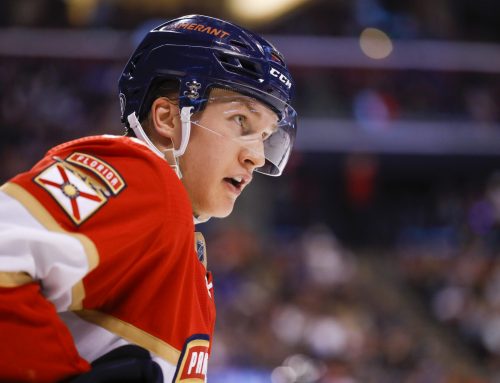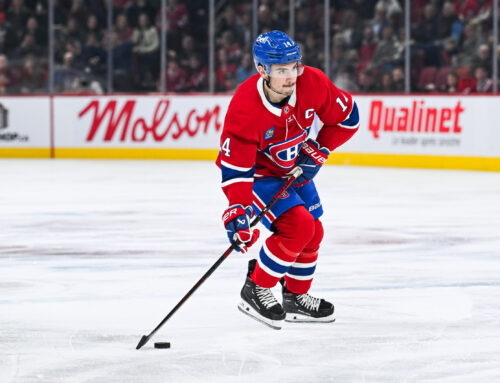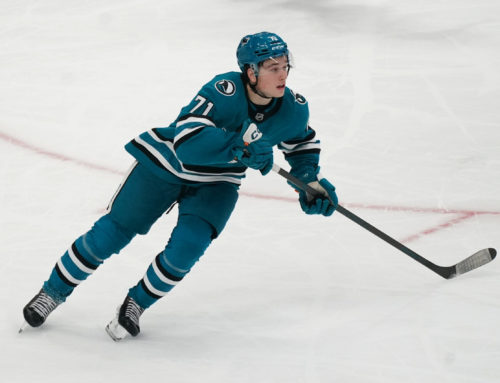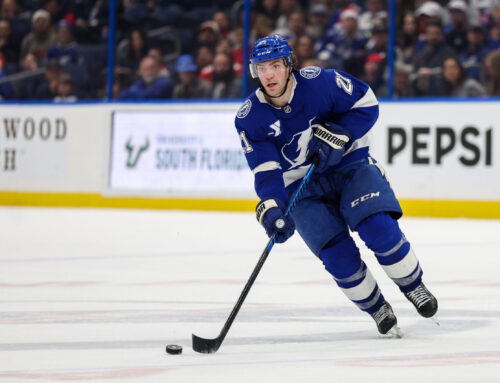7 Playoff Duds
Rick Roos
2013-06-17

Seven Playoff Duds – Time to Worry?
Fantasy hockey veterans know that players who do great in the playoffs – or the preseason – often don’t match (let alone build on) that success in the regular season, which is when their stats really count for most fantasy hockey leagues. But what about guys who do poorly in the playoffs? Should that be a concern for poolies going into the 2013-14 regular season?
With that question in mind, I’ll cover seven players who performed (or are performing) well below their regular season production in the 2012-13 playoffs. For a “Final Verdict”, I'll give a prediction on whether each player's 2013-14 performance will be more like what he did during the 2012-13 regular season, more like what he did in the 2012-13 playoffs, or somewhere in between.
Note that I’ve focused the list mostly on guys who skated for more than five playoff games, to ensure a decent sample size. I also didn't include players (like Dustin Brown or Niklas Kronwall), where it has since become clear that their poor playoff performance was due in large part to injury.
Andrew Cogliano (Regular Season = 23 points in 48 games; Playoffs = one point in seven games)
Cogliano's breakout regular season, which included 13 goals (more than either Bobby Ryan or Teemu Selanne), hit a brick wall during the playoffs. This happened despite his ice time (almost no PP time and just over 15:00 TOI in both the regular season and playoffs) and linemates (44% with Saku Koivu and Daniel Winnik during the regular season, over 60% during the playoffs, according to Frozen Pool) remaining pretty much unchanged. Honestly, I think his slump during the playoffs was a case of young player nerves, especially considering that many of his teammates were either around for the Ducks Stanley Cup win or at least had a taste of previous playoff experience, unlike Cogliano who was a true NHL postseason newbie.
Final Verdict: I see Cogliano as a player on the rise who should have no trouble doing even better in 2013-14 than he did during the 2012-13 regular season. And with that you should safely consider his playoff performance just a blip on the radar, unless you want to try to use it to your advantage to help grab him in a trade from an owner who might be growing concerned at this point.
Tyler Seguin (Regular Season = 32 points in 48 games; Playoffs through finals game 2 = six points in 18 games)
While it's possible that Seguin will continue to right his ship somewhat by the end of the Cup finals (he's already produced two points in the first two games), there's almost no way he'll do well enough to be able look back and see this postseason as anything but a huge personal disappointment. Not only was Seguin displaced from the Boston top six by Jaromir Jagr, but he wasn't the catalyst for the third line that Boston had hoped. Unlike with Cogliano, this can't be chalked up to growing pains, as Seguin was part of the Bruins Cup winning team from 2011. And keep in mind that Seguin had limped to the finish line at the end of the regular season too, with a mere six points in his final 15 games.
Final Verdict: Seguin is too good a player to be sitting at 12 points in his last 33 games, and I wouldn't be shocked to hear he's been playing through some sort of an injury. But even if that's not the case, I see him doing at least as well next year as he did in the 2012-13 regular season, especially since he's still managed to lead the Bruins in shots on goal for the overall playoffs. Plus, with Jaromir Jagr and Nathan Horton both scheduled to be UFAs this offseason and at least one of them likely to depart, there is little doubt that Seguin will be back in his familiar top six spot with the Bs for 2013-14.
Brandon Saad (Regular season = 27 points in 46 games; Playoffs through finals game 2= five points in 19 games)
Like Seguin, Saad still has a chance to bolster his playoff production, and took a step in that direction with a key goal in game one of the Cup finals. But unless he goes on a major tear he'll end up with an overall playoff scoring pace that would be poor for even a defenseman. So what went wrong? Unlike Cogliano, this can be traced to ice time, as although Saad's PP time and overall TOI in the playoffs are close to what he received in the regular season, we have to keep in mind that those numbers were weighed down by his very low ice time during 20 games in January and February. To me, his scoring woes can be blamed somewhat on rookie nerves, but for the most part it's the ice time situation coupled with a bad stretch that anyone – even a playoff veteran – could endure.
Final Verdict: Even if Saad doesn't score another point in these playoffs, I still see him as a lock to produce even better than he did in the 2012-13 regular season, especially since forwards who are rookies at age 21 or younger tend to be less likely to fall victim to the dreaded sophomore slump. Those of you eager to get Saad in trade should hope for the worst in the playoffs, then try to do whatever you can to worry his owner into making a trade that he or she will ultimately regret.
Brad Richards (Regular season = 34 points in 46 games; Playoffs = one point in 10 games)
Richards had perhaps the most well documented playoff struggle in all of the NHL this season, culminating in him watching from the press box as the Rangers were sent packing by the Bruins. Clearly John Tortorella was not a fan of Richards, and the feeling was likely mutual. Of course Alan Vigneault is now going to be behind the Ranger bench, so the question becomes whether Richards can step back up to reclaim his spot as the #1 or at least #1A/1B center for the Blueshirts. The big issue is that Vigneault is notorious for leaning on his top line and rewarding guys who are two way workhorses, and right now, it's not clear if/how Richards fits into either category.
Final Verdict – We have to remember that Richards is a guy who's still just 33 and only two seasons removed from a stretch of 168 points in 152 games. In the end, unless the Rangers use an buyout on Richards, it's a pretty safe bet that he'll be given ample opportunity to show he can still produce on a top line. Plus, even if he does get bought out, he'll likely be grabbed by a team that will count on him to play big minutes, and then he'll have added motivation to make the Rangers regret their decision. I think it's still safe to pencil in Richards for production in 2013-14 on a level at least as good as his 2012-13 regular season pace.
Drew Doughty (Regular season = 22 points in 48 games; Playoffs = five points in 18 games)
For the third year in a row, Doughty had a good but not great regular season, finishing right near the 0.5 points per game mark. But unlike past seasons (Doughty had 27 points in 32 career playoff games before this season), he laid an egg in the postseason. I see this as a huge red flag, especially given the offensive emergence of Slava Voynov, who is said to be close to signing a long term deal with the Kings, and, to a lesser extent, Jake Muzzin.
Final Verdict – With this year's disappointment, Doughty seems to be continuing his path toward becoming the next Jay Bouwmeester in that expectations for his production will remain high long past when they should. Poolies holding out hope for Doughty to come close to his 59 point career best should wake up from dreamland, as I'm not even convinced he's a good bet for 40 points again.
Chris Stewart (Regular season = 36 points in 48 games; Playoffs = one point in six games)
Stewart looked to have bounced back into form with his regular season production, which was good enough to lead all Blues in scoring by a wide margin and was actually six points higher than he accumulated in 31 more games during the 2011-12 regular season. But signs of this offensive resurgence were nowhere to be found in the playoffs, and his one point in six games brought his career postseason numbers to a meager six points in 19 total games. Given this, plus the legitimate questions about whether he can produce on a consistent basis, coupled with the excess of decent scoring options within the top nine of the Blues, there simply might be too many red flags with Stewart at this point.
Final Verdict – Of all the players on this list, I see Stewart as the safest bet to have a downward slide during the 2013-14 regular season, although it's not so much because of his poor playoff performance as it is due the other factors I mentioned and the very high shooting percentage (18.6%) he had during the 2012-13 regular season.
John Carlson (Regular season = 22 points in 48 games; Playoffs = one point in seven games)
Carlson had a decent regular season, scoring at the same 37 point full season pace as he did during his 2010-11 breakout campaign. But I think that his offensive uptick had more to do with the Capitals rebounding into high scoring form than Carlson himself doing better offensively. He remains a victim of his own well rounded talents in that although he could likely shoulder more of an offensive load the truth is he's so great defensively that the team has no choice but to lean on him to fill that role, at the expense of offensive stats. And given that defense is even more key in the playoffs, it's no surprise that Carlson had such a poor point showing in the postseason.
Final Verdict – I'd peg Carlson as a decent bet to finish at right around a 35-40 point pace in 2013-14, which is right at his 2012-13 level, and only due to the Caps offense continuing to come back into form under Adam Oates. Resist the temptation to expect anything more than that.
Recent Holding Court:
| 1 | Fun with Google Instant Search | |
| 2 | Eight Good Players Who Aren’t Worth the Asking Price | |
| 3 | Eight Players Who Aren’t As Bad As They Seem |





 PHI
PHI ANA
ANA VAN
VAN DET
DET BUF
BUF NYR
NYR MIN
MIN CAR
CAR
